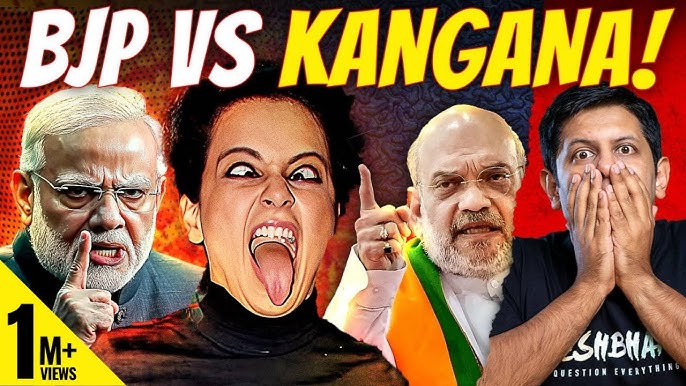
Introduction to the Controversy
The controversy surrounding Kangana Ranaut, a prominent Bollywood actress, and her potential expulsion from the Bharatiya Janata Party (BJP) has captured widespread attention. This dramatic turn of events began with a series of provocative statements made by Ranaut, which quickly escalated into a politically charged scandal.
The initial incident that set off the controversy occurred in late September when Kangana Ranaut publicly criticized the BJP’s handling of certain socio-political issues. Her comments, perceived as overly harsh and divisive, were made during an interview and subsequently amplified through her social media channels. The actress accused the BJP leadership of failing to address critical concerns, which spurred a variety of reactions both supportive and condemnatory.
One of the most contentious statements made by Ranaut involved her criticism of a senior BJP leader, which she posted on Twitter. “The current leadership is disconnecting from its core values and principles. If this continues, one can only imagine the consequences,” she tweeted. This tweet went viral, drawing intense scrutiny from the public, media, and members of her own party.
Political figures were quick to respond. A notable statement came from a BJP spokesperson, who remarked, “Such irresponsible utterances are unacceptable. Mrs. Ranaut’s views do not reflect the party’s stance, and we will be reviewing this matter seriously.” This stern response underscored the gravity of her comments and hinted at possible ramifications, including expulsion from the party.
The controversy gained momentum as social media lit up with reactions. While some supported Ranaut’s right to free speech, others condemned her for what they saw as an unwarranted attack on the BJP. Hashtags such as #KanganaVsBJP and #BJPControversy trended, highlighting the polarized views on her statements.
This controversy is particularly significant due to its timing and the stature of the parties involved. Kangana Ranaut’s outspoken nature has always been a double-edged sword, but this incident seems to have crossed a boundary, leading to serious political implications. The BJP, known for its disciplined image and strict adherence to party lines, finds itself in a complex situation where balancing freedom of expression and maintaining party integrity becomes paramount.
BJP’s Response to the Controversy
The Bharatiya Janata Party (BJP) has been swift in addressing the recent controversy surrounding Kangana Ranaut. High-ranking officials have issued a range of statements that reflect the party’s internal divisions on the matter.
Senior BJP leader, Rajnath Singh, publicly denounced Ranaut’s recent actions, labeling them as “unbecoming and detrimental” to the party’s values. He emphasized the need for accountability and reiterated the party’s commitment to maintaining its ethical standards. Similarly, another prominent member, Nitin Gadkari, highlighted that no individual, regardless of their public stature, is above the party’s principles and guidelines.
However, not all voices within the BJP are united in condemnation. Some members, such as Narayan Rane, have voiced conditional support for Ranaut, arguing that while her methods were controversial, her underlying intentions aligned with the party’s objectives. This has sparked a significant internal debate within the party, revealing a schism between hardliners and more moderate factions.
Amidst these divergent views, the party has initiated a formal internal investigation to examine the extent and impact of Ranaut’s actions. This probe aims to ascertain whether her behavior warrants punitive measures such as suspension or censure. Such steps highlight the BJP’s efforts to uphold discipline and policy consistency, essential components for party cohesion and public trust.
This incident draws parallels with past controversies involving BJP members. For instance, when a similar situation arose with member Subramanian Swamy, the party had instituted a temporary suspension to preserve its integrity. These precedents underscore the BJP’s longstanding intolerance for actions that could tarnish its reputation.
The broader implications for party discipline are significant. As the BJP navigates this controversy, it underscores the importance of uniformity and adherence to its established policies. By taking decisive action, the party aims to reaffirm its foundational principles, ensuring that disagreements or controversies do not overshadow its collective mission.
Potential Consequences for Kangana Ranaut and the BJP
Kangana Ranaut’s possible expulsion from the Bharatiya Janata Party (BJP) could trigger a myriad of outcomes for both her and the political party. The procedural steps for her expulsion would likely include an internal review, formal meetings, and an official declaration. This process would be significant not only for its immediate effects but also for its implications on her professional trajectory and the BJP’s future.
For Kangana Ranaut, this expulsion may mark a turning point. Professionally, her career in the entertainment industry might face challenges, particularly if potential collaborators view her as a liability. Politically, her credibility might suffer, making future endeavors in this arena more difficult. The public and media reactions are crucial to consider; her supporters may rally behind her, while critics might use the situation to underscore perceived faults. The bifurcation in public opinion can lead to polarized media coverage, influencing her standing in the public eye.
For the BJP, this situation presents a dual-edged sword. On one hand, expelling a controversial figure could demonstrate the party’s commitment to discipline and integrity. It may bolster the party’s image among certain voter demographics, emphasizing zero tolerance for conduct that deviates from party principles. Conversely, such a move might alienate some of her supporters within the party, thereby affecting voter sentiment, especially in upcoming elections. The media’s portrayal of this expulsion will be significant in shaping public perception.
Moreover, this incident could set a precedent for the BJP’s future interactions with high-profile public figures and celebrities. It will likely influence the party’s approach to managing relationships with influential personalities, framing the boundaries of acceptable behavior. The long-term implications for party unity and discipline cannot be overlooked. Ensuring a balance between inclusivity and adherence to party philosophies will be vital in maintaining cohesion and avoiding factionalism.
